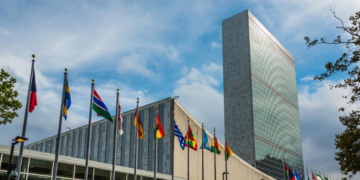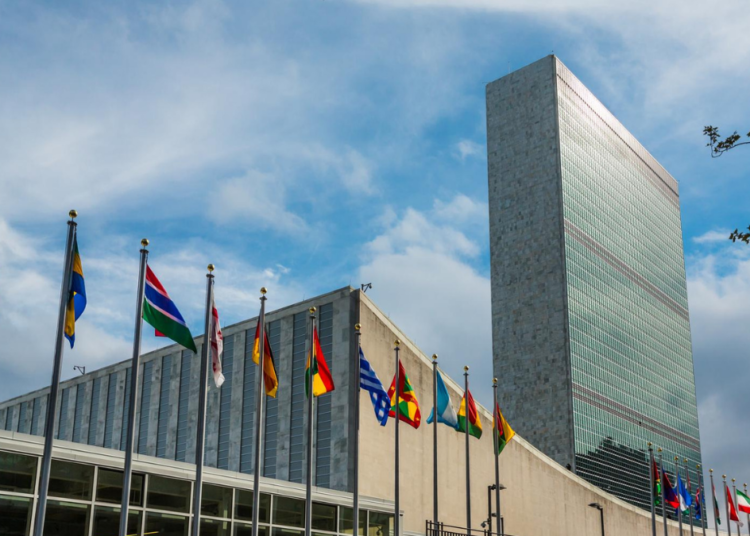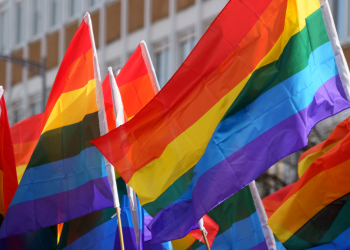Responding to the UN’s call for input for a report to be submitted to the Human Rights Council regarding the right to religious freedom vis-à-vis so-called SOGI (sexual orientation and gender identity) rights, the IOF has submitted the following, which has also been provided to all UN missions in New York.
International Organization for the Family
(Howard Center for Family, Religion and Society)
15 January 2023
Response to the “Call for input to a thematic report” to be presented at the 53rd session of the UN Human Rights Council in June 2023 by “the UN Independent Expert on protection against violence and discrimination based on sexual orientation and gender identity (IE SOGI), exploring the right to freedom of religion or belief (FoRB) in relation to sexual orientation and gender identity (SOGI).”
In his call for input to inform the thematic report to the Human Rights Council, the UN Independent Expert (IE) stated,
The report will put forward recommendations to States and other relevant stakeholders to fully comply with their obligations under international human rights law to protect and empower LGBT+ persons to pursue happiness, exercise and enjoy all their human rights, and choose how to contribute to society on an equal footing with everyone, including through effective participation in religious, cultural, social, and public life.
While we wholeheartedly support the rights of all LGBT+ persons, we believe the protection of those rights necessarily begins with determining their nature and scope as suggested by the Universal Declaration of Human Rights, whose foundational influence on human rights is unprecedented and unparalleled.
Although not a binding legal document, the Declaration is widely considered to be what Eleanor Roosevelt hoped it would become—“the international Magna Carta of all men everywhere.”[1] It has recently been referred to as “a moral guiding star”[2] by Professor Hans Ingvar Roth, while Professor Mary Ann Glendon has emphasized that “the most impressive advances in human rights owe more to the moral beacon of the Declaration than to the many covenants and treaties that are now in force.”[3]
Well is the UDHR titled “Universal,” for it expressly includes within its purview “all members of the human family” (Preamble), “all human beings” (Article 1), and “everyone” (Articles 2, 3, 6, 8, 10, 11, 12, 13, 14, 15, 17, 18, 19, 20, 21, 22, 23, 24, 25, 26, 27, 28, 29). Particularly noteworthy is the language in Article 2: “Everyone is entitled to all the rights and freedoms set forth in this Declaration, without distinction of any kind, such as race, colour, sex, language, religion, political or other opinion, national or social origin, property, birth or other status” (emphasis added).
Hence under the UDHR, the rights of LGBT+ people do not arise out of their LGBT+ status but rather out of their status as members of the human family. To assume otherwise by according special or even superior rights to LGBT+ people vis-à-vis the rest of humanity—as the IE’s questions (to which we are responding in the aggregate) seem to presuppose or imply—is to distort the delicate human rights structure so painstakingly created by the drafters of the UDHR and to encroach on the legitimate rights of others, as warned in the 2020 Report of the Commission on Unalienable Rights. Referring to, among other things, “the many different UN agencies” and “regional human rights systems,” the report declared,
There is good reason to worry that the prodigious expansion of human rights has weakened rather than strengthened the claims of human rights and left the most disadvantaged more vulnerable. More rights do not always yield more justice. Transforming every worthy political preference into a claim of human rights inevitably dilutes the authority of human rights….
The UDHR was deliberately limited to a small set of rights on which there was perceived to be a near-universal consensus. The fact is that the power of the universal human rights idea is strongest when grounded in principles so widely accepted as to be beyond legitimate debate; it is weakest when it is employed in disputes among competing groups in society over political priorities. Such political disputes are usually best left up to resolution through ordinary democratic processes of bargaining, education, persuasion, compromise, and voting. The tendency to fight political battles with the vocabulary of human rights risks stifling the kind of robust discussion on which a vibrant democracy depends. The effort to shut down legitimate debate by recasting contestable policy preferences as fixed and unquestionable human rights imperatives promotes intolerance, impedes reconciliation, devalues core rights, and denies rights in the name of rights.[4]
Fortunately, no expansion of rights under the UDHR is necessary to shelter LGBT+ people from violence, since they are already included in the robust provisions extended to all people: “Everyone has the right to life, liberty and security of person” (Article 3), and “No one shall be subjected to torture or to cruel, inhuman or degrading treatment or punishment” (Article 5). The UDHR goes even further and proclaims that “All human beings… should act towards one another in a spirit of brotherhood” (Article 1).
The spirit of brotherhood is a high ideal that could go a long way toward resolving differences of opinion between competing rights, but at the very least, the UDHR envisages a balancing of competing rights based on mutual respect.
In the exercise of his rights and freedoms, everyone shall be subject only to such limitations as are determined by law solely for the purpose of securing due recognition and respect for the rights and freedoms of others and of meeting the just requirements of morality, public order and the general welfare in a democratic society.
Among the rights enumerated in the UDHR, the right to freedom of conscience and religion stands out for its repeated mention: “human beings shall enjoy freedom of speech and belief” (Preamble); “All human beings are… endowed with reason and conscience” (Article 1); “Everyone has the right to freedom of opinion and expression” (Article 19); and, most descriptively, “Everyone has the right to freedom of thought, conscience and religion; this right includes freedom to change his religion or belief, and freedom, either alone or in community with others and in public or private, to manifest his religion or belief in teaching, practice, worship and observance” (Article 18).
The United Nations later decided that Article 18 was of such significance as to make it a treaty obligation. The 1966 International Covenant on Civil and Political Rights, Article18, closely tracks the UDHR in providing:
1. Everyone shall have the right to freedom of thought, conscience and religion. This right shall include freedom to have or to adopt a religion or belief of his choice, and freedom, either individually or in community with others and in public or private, to manifest his religion or belief in worship, observance, practice and teaching.
2. No one shall be subject to coercion which would impair his freedom to have or to adopt a religion or belief of his choice.
3. Freedom to manifest one’s religion or beliefs may be subject only to such limitations as are prescribed by law and are necessary to protect public safety, order, health, or morals or the fundamental rights and freedoms of others.
Echoes of this obligation resound in other UN documents, including the 1993 Vienna Declaration and Programme of Action, paragraph 22 (“recognizing that every individual has the right to freedom of thought, conscience, expression and religion”) and the 1995 Report of the Fourth World Conference on Women, paragraph 24 (“Religion, spirituality and belief play a central role in the lives of millions of women and men, in the way they live and in the aspirations they have for the future. The right to freedom of thought, conscience and religion is inalienable and must be universally enjoyed”).
Freedom of religion is as significant for societies as it is for individuals, says Professor Robert P. George, who has served as chair of the U.S. Commission on International Religious Freedom.
[R]eligious freedom means that, both as individuals and in community, we have the right to ponder life’s origins, meaning, and purpose; to explore the deepest questions about human nature, dignity, and destiny; to decide what is to be believed and not to be believed; and, within the limits of justice for all, to comply with what we conscientiously judge to be our religious obligations, and to do so openly, peacefully, and without fear….
Because religious freedom is so central to human personhood, we would expect that in places where it is dishonored, societies would be less happy and secure. According to a growing number of studies, that is precisely the case. These studies show that countries that protect religious liberty are more secure and stable than those that do not, and nations that trample on this freedom provide fertile ground for war and poverty, terror and radical movements. In other words, religious freedom abuses not only violate the core of our humanity, but also do grave harm to the well-being of societies.
They do so politically, as religious freedom abuses are highly correlated with the absence of democracy and the presence of other human rights abuses. They do so economically, as religious persecution destabilizes communities and marginalizes the persecuted, causing their talents and abilities to go unrealized, robbing a nation of added productivity, and reducing that nation’s ability to fight poverty and create abundance for its citizens. They do so morally, since wherever religious freedom is dishonored, the benefit of religion in molding character is diminished, and with it, the self-discipline necessary to handle the rights and responsibilities of citizenship. And finally, they do so socially, since wherever religious freedom is restricted, peace and security become ever more elusive.[5]
Given the indispensability of religious freedom to a flourishing society, can it be a mere coincidence that the Founders of the United States were united in articulating religious liberty as the first freedom? As emphasized by Professor Douglas Laycock in speaking about the First Amendment to the United Stated Constitution, “The Religion Clauses were no compromise of conflicting interests, but the unified demand of the most vigorous advocates of religious liberty.”[6]
Of course, not even religious liberty is an absolute right, for as Professor Glendon has noted in speaking of the UDHR, “everyone’s rights are importantly dependent on respect for the rights of others, on the rule of law, and on a healthy civil society.”[7]
In the interest of maintaining a healthy civil society and securing the rights of everyone, we urge that the right to religious freedom be given its duly substantial weight in balancing it vis-à-vis other rights, especially those faux rights of which the Commission on Unalienable Rights warned: “The effort to shut down legitimate debate by recasting contestable policy preferences as fixed and unquestionable human rights imperatives promotes intolerance, impedes reconciliation, devalues core rights, and denies rights in the name of rights.”
[1] Statement to the United Nations General Assembly at the adoption of the Universal Declaration of Human Rights, December 9, 1948, available at https://erpapers.columbian.gwu.edu/statement-united-nations-general-assembly-universal-declaration-human-rights-1948.
[2] Hans Ingvar Roth, P. C. Chang and the Universal Declaration of Human Rights (Philadelphia: University of Pennsylvania Press, 2016), 135.
[3] Mary Ann Glendon, A World Made New: Eleanor Roosevelt and the Universal Declaration of Human Rights (New York: Random House, 2001), 236.
[4] Report of the Commission on Unalienable Rights, 39, 57. https://2017-2021.state.gov/wp-content/uploads/2020/08/Report-of-the-Commission-on-Unalienable-Rights.pdf. The Commission was created in 2019 by U.S. Secretary of State Mike Pompeo; see https://2017-2021.state.gov/commission-on-unalienable-rights/index.html.
[5] Robert P. George, “Religious Freedom & Why It Matters,” https://www.touchstonemag.com/archives/article.php?id=27-03-022-f&readcode=&readtherest=true#therest.
[6] Douglas Laycock, Religious Liberty, 5 vols., Emory University Studies in Law and Religion (Grand Rapids: Eerdmans, 2010), 1:689, from Laycock’s “Continuity and Change in the Threat to Religious Liberty: The Reformation Era and the Late Twentieth Century,” 80 Minnesota Law Review 1047 ff. (1996).
[7] Mary Ann Glendon, A World Made New: Eleanor Roosevelt and the Universal Declaration of Human Rights (New York: Random House, 2001), 239.




















Discussion about this post